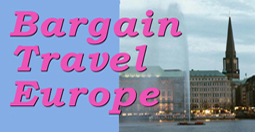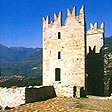CASALMAGGIORE
Northern Italy Crossroads - Garibaldi to Costume Jewelry
 The
flat plains of the Po River valley in Northern Italy between Milan
and Bologna are probably less traveled than more familiar regions of
Italy, but provide unique spots for stops along the traveling road.
Casalmaggiore, an otherwise quiet Italian small town on the banks of
the Po, found itself at the crossroads of Italian history when the
unifier of the modern Italian state, Giuseppe Garibaldi declared from
its central square "Roma o Morte" - To Rome
or Die.
Located in the region of Cremona just north of Parma, the town was
first ruled
by the Milanese, later by the Venetians, then Napoleon. Not only a
road landmark for Italian political history Casalmaggiore also lies
on the route of the annual legacy Italian sports car race, the Mille
Miglia (See Vintage
Race 1000 Miles to Rome). Casalmaggiore was first
founded in 69 A.D., rather late
as Roman towns go, and first known as Mastra Majora.
The
flat plains of the Po River valley in Northern Italy between Milan
and Bologna are probably less traveled than more familiar regions of
Italy, but provide unique spots for stops along the traveling road.
Casalmaggiore, an otherwise quiet Italian small town on the banks of
the Po, found itself at the crossroads of Italian history when the
unifier of the modern Italian state, Giuseppe Garibaldi declared from
its central square "Roma o Morte" - To Rome
or Die.
Located in the region of Cremona just north of Parma, the town was
first ruled
by the Milanese, later by the Venetians, then Napoleon. Not only a
road landmark for Italian political history Casalmaggiore also lies
on the route of the annual legacy Italian sports car race, the Mille
Miglia (See Vintage
Race 1000 Miles to Rome). Casalmaggiore was first
founded in 69 A.D., rather late
as Roman towns go, and first known as Mastra Majora.  The central square
named for its most famous visitor
Piazza Garibaldi is one of the largest public squares in the north
of Italy. The architecture around the square and city is late Renaissance,
later renovated in the 19th Century neo-gothic, featuring the Marcheselli
Palace and the Church of Santa Croce with an auditorium offering concerts
and performances. During the year there are exhibitions held, along
with cultural events and the busy town market on Saturday. Every July
the Caselmaggiore International Music Festival is held
for
young musicians with concerts in venues around the area.
The central square
named for its most famous visitor
Piazza Garibaldi is one of the largest public squares in the north
of Italy. The architecture around the square and city is late Renaissance,
later renovated in the 19th Century neo-gothic, featuring the Marcheselli
Palace and the Church of Santa Croce with an auditorium offering concerts
and performances. During the year there are exhibitions held, along
with cultural events and the busy town market on Saturday. Every July
the Caselmaggiore International Music Festival is held
for
young musicians with concerts in venues around the area.
 In
the Palazzo Mina Tentolini a building were Garibaldi stayed in 1862
bears an inscription of his
famous rally cry. The most grand scale building in town is the neo-gothic
Palazzo Municipale. The octagonal church of Santa Chiara in the Piazza
Martini was part of a convent
dating to the fifteenth century and contains two significant artworks “The
Holy Family” and “Nativity with St. Claire” by Luigi Amidano.
The Renaissance era Palazzo Martinelli is home to the G. Bottoli Fine Arts
School, created in the earth 20th century to give Italian craftsmen a cultural
and artistic preparation. It maintains a collection of plaster casts, paintings,
drawings and engravings from its past. Perhaps one of the more curious museums
in this region, and the only one of its kind in Italy is the Bijou
Museum.
Casalmaggiore was a center of costume jewelry manufacture and the museum contains
thousands of samples of costume jewelry from the early 20th century up to the
1970s when the industry waned, along with artifacts and images from the Casalmaggiore
factories. Casalmaggiore also offers nature walks along the Po with parks,
horse riding and bike paths.
In
the Palazzo Mina Tentolini a building were Garibaldi stayed in 1862
bears an inscription of his
famous rally cry. The most grand scale building in town is the neo-gothic
Palazzo Municipale. The octagonal church of Santa Chiara in the Piazza
Martini was part of a convent
dating to the fifteenth century and contains two significant artworks “The
Holy Family” and “Nativity with St. Claire” by Luigi Amidano.
The Renaissance era Palazzo Martinelli is home to the G. Bottoli Fine Arts
School, created in the earth 20th century to give Italian craftsmen a cultural
and artistic preparation. It maintains a collection of plaster casts, paintings,
drawings and engravings from its past. Perhaps one of the more curious museums
in this region, and the only one of its kind in Italy is the Bijou
Museum.
Casalmaggiore was a center of costume jewelry manufacture and the museum contains
thousands of samples of costume jewelry from the early 20th century up to the
1970s when the industry waned, along with artifacts and images from the Casalmaggiore
factories. Casalmaggiore also offers nature walks along the Po with parks,
horse riding and bike paths.
 Casalmaggiore is 40 miles from
Cremona and nearly equidistant from Parma and Mantua in the flat valley
of the Po River which has a tendency to flood from time to time. It
is a stop on the rail line between Brescia (see Brescia
Castle and Cathedral) and Parma. Between Casalmaggiore
and Parma are some of the most curiously fascinating cemeteries in
Europe. A practice established
by the wealthy families of Parma to combat the flooding of the Po River,
the cemeteries are constructed above ground in mausoleums which appear
at first glance like complete gated cities of houses and “apartments” of
their own architectural styles, depending on the age, and dutifully
tended by old woman caretakers, keeping them fresher and cleaner than
many Italian cities for the living.
Casalmaggiore is 40 miles from
Cremona and nearly equidistant from Parma and Mantua in the flat valley
of the Po River which has a tendency to flood from time to time. It
is a stop on the rail line between Brescia (see Brescia
Castle and Cathedral) and Parma. Between Casalmaggiore
and Parma are some of the most curiously fascinating cemeteries in
Europe. A practice established
by the wealthy families of Parma to combat the flooding of the Po River,
the cemeteries are constructed above ground in mausoleums which appear
at first glance like complete gated cities of houses and “apartments” of
their own architectural styles, depending on the age, and dutifully
tended by old woman caretakers, keeping them fresher and cleaner than
many Italian cities for the living.
Two
walled cities lie nearby, Piacenza ancient city on the Via Romagna
and Sabbioneta the personal
walled
town created by a Duke of Lombardy, Vespasiano Gonzaga, who built
the first “designed city” as a monument to himself (see Sabbioneta
Walled City).
A few minutes to the south of Casalmaggiore is the 18th Century Ducal
Palace Reggia di Colorno (see
Colorno Baroque Palace and Gardens,
designed to emulate the
lavishness
of the Versailles
Palace and
for a time, when the region was under the French Emperor Napoleon’s
control, was the favorite palace of Bonaparte’s second wife
Marie Louise (see Fontainebleu
Palace) who spent time there while
her busy hubby was out on the road conquering one place or another.
To the south of Parma in the low hills of the Apennines you can find
family
farms
making
Parmesan
cheese
that can be tasted similar to wine touring, and to the east lies
Reggio Nell’Emilia and Modena with its famed Balsamic Vinegars
(see Intrepid
Italian Tours). © Bargain
Travel Europe
Find best hotel and vacation deals in Emilia-Romagna
These articles are copyrighted
and the sole property of Bargain Travel Europe and WLPV, LLC. and
may not be copied or reprinted without permission.
SEE ALSO:
FORTIFIED
PORTO ERCOLE
SEASIDE
SILENCIO
Historic Villa Hotel on Italy's Northern Liguria Coast
TAKE A COOKING CLASS
HOLIDAY IN UMBRIA
La Volpe e L’Uva - The Fox and Grapes Farm

